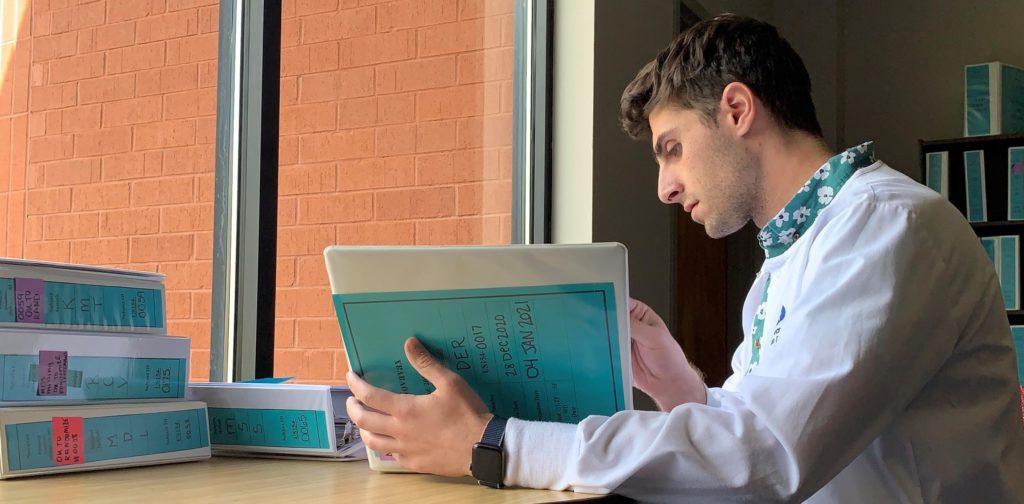
The UMES School of Pharmacy utilizes a three-year, year-round, modular curriculum. The professional curriculum provides a broad biomedical, pharmaceutical, social, administrative, and clinical science foundation. Upon completion of the curriculum the student should possess a core of knowledge, skills, attitudes, and values necessary to practice contemporary pharmacy practice. There are two major components of the program: the didactic and the experiential components.
The didactic component consists primarily of classroom and laboratory experiences in the first two professional years (SP-1 and SP-2 years). The didactic content is delivered as a modular system in which students concentrate on one content area at a time, allowing the students to master each topic before moving on to the next content area. The SP-1 and SP-2 years will be divided into two terms, a fall term and a spring term. These terms are longer than a regular semester to allow for completion of the required credit hours.
The experiential component begins in the SP-1 year, with Introductory Pharmacy Practice Experiences (IPPEs). Students participate in community and institutional pharmacy preparatory classes throughout the fall and spring terms. At the end of each term, they have three weeks of full-time field experience. In the SP-2 year IPPEs are patient-centered where students follow specific patients and evaluate their progress. Advanced Pharmacy Practice Experiences (APPEs) start in the summer following the SP-2 year and continue throughout the SP-3 year. During APPEs students increase their professional skills as they take part in eight rotations in traditional and specialized practice settings. The Professional Seminar capstone course allows students to pull together elements of their entire educational experience through student presentations, case-studies, and a board review.
Course Schedule and Credits
Program Total Credit Required Hours = 164.5
| First Academic Year (SP-1) | Fall Credits | Spring/Sum. Credits |
|---|---|---|
| PHAR 530 Pharmaceutics and Biopharmaceutics | 4.5 | |
| PHAR 501 Basics of Drug Information and Intro to Pharmacy Profession | 1.5 | |
| PHAR 510 Fundamentals of Drug Action and Metabolism | 3 | |
| PHAR 511 Genetic Controls of Cell Func., Cell Reprod. and Protein Synthesis | 2.5 | |
| PHAR 512 Metabolism of Carbohydrates, Lipids, and Amino Acids | 4 | |
| PHAR 523 Endocrine System: Pharmacology and Medicinal Chemistry | 1.5 | |
| PHAR 540 Pharmacy Administration I – Health Care Delivery | 2 | |
| PHAR 550 Pharmaceutical Calculations | 2 | |
| PHAR 542 Concepts in Diversity and Communication For The Pharmacist | 3 | |
| PHAR 561 Professional Development I | 1 | |
| PHAR 571 IPPE I | 5 | |
| PHAR 520 Principles of Neurobiology and Neuropharmacology | 1 | |
| PHAR 525 Neuropharmacology and Medicinal Chemistry | 3.5 | |
| PHAR 521 CV & Renal: Pharmacology and Medicinal Chemistry | 2 | |
| PHAR 522 GI & GU: Pharmacology and Medicinal Chemistry | 1 | |
| PHAR 513 Hematology and Immunology | 4 | |
| PHAR 531 Pharmacokinetics | 3.5 | |
| PHAR 524 Toxicology | 1 | |
| PHAR 541 Pharmacy Law | 1.5 | |
| PHAR 514 Biostatistics and Clinical Trial Design | 1.5 | |
| PHAR 543 Public Health for Pharmacists | 2 | |
| PHAR 544 Direct Patient Care in Pharmacy Practice | 3 | |
| PHAR 562 Professional Development II | 1 | |
| PHAR 572 IPPE II | 5 | |
| Total SP-1 SCH 60 | 30 | 30 |


